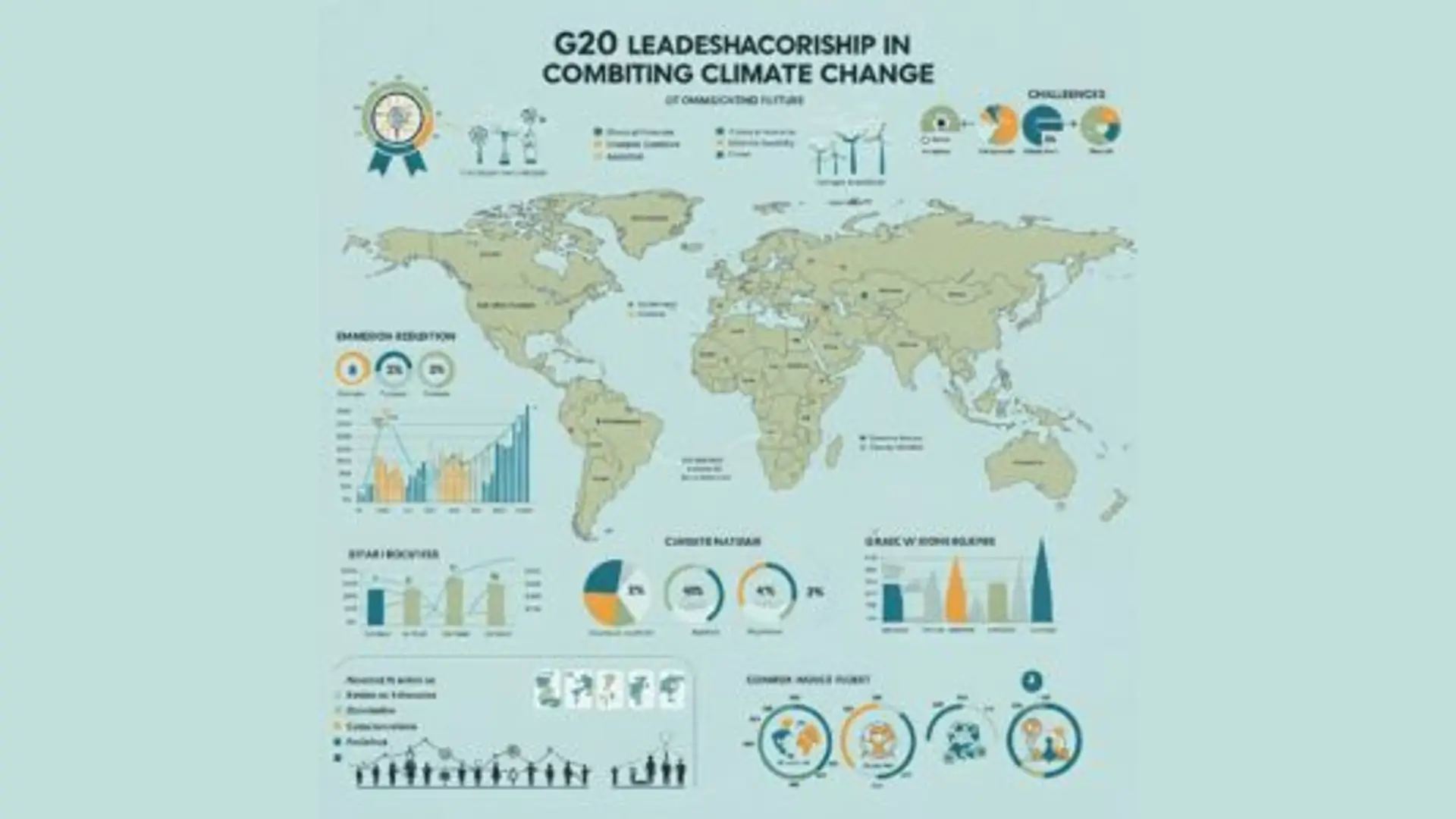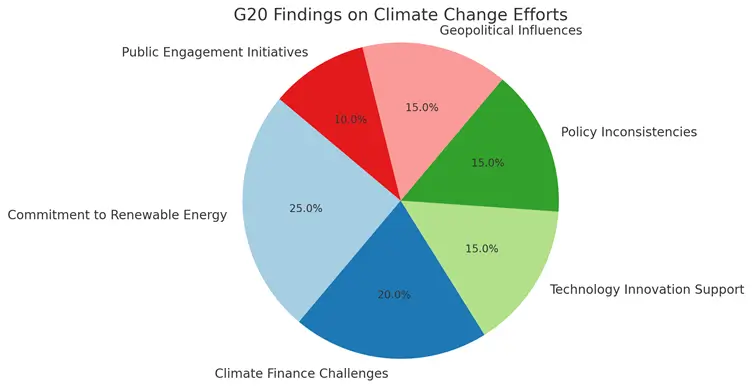G20 Leadership in Combating Climate Change: Challenges, Progress, and the Road Ahead
- Author (s) Jha Pranav Kumar

Table of Contents
Abstract
Climate change presents a critical global challenge requiring cooperative international action. The G20, comprising the world’s major economies, plays a pivotal role in addressing climate issues through policy formulation, funding, and technological innovation. With member nations accounting for a significant share of global greenhouse gas emissions and economic output, their commitment and actions are essential to the success of international climate agreements like the Paris Accord. This paper explores the G20’s leadership role in combating climate change, analyzing the challenges, progress achieved, and potential pathways for future action. It delves into the gaps between promises and actual outcomes, investigates the influence of geopolitical tensions on climate initiatives, and assesses the effectiveness of various G20 policies. Drawing on a comprehensive literature review and qualitative data analysis, the study highlights both the successes and shortcomings of G20 initiatives, emphasizing the urgent need for stronger accountability, enhanced financial mechanisms, and innovative approaches to climate governance. By providing targeted recommendations, this paper aims to contribute to the ongoing discourse on strengthening global cooperation for a more sustainable and resilient future.
Keywords: G20, Climate Change, Global Governance, Environmental Policy, Sustainable Development
Introduction
Climate change stands as a defining issue of the 21st century, influencing weather patterns, threatening food security, increasing natural disasters, and exacerbating global inequalities. As a collective of the world’s largest economies, the G20’s contribution is critical to achieving global climate goals. Since the early 2000s, the G20 has progressively incorporated climate change into its agenda, recognizing its interconnectedness with economic stability and global development. The G20’s leadership is instrumental due to its economic leverage and technological capacities, yet divergent national interests, economic dependencies on fossil fuels, and varying stages of development among its members often hinder unified action.
Climate change is a global issue that affects all countries, including India, which is one of the world’s largest emitters of greenhouse gases. The G20 is a group of the world’s largest economies, including India, and plays a crucial role in addressing climate change on a global scale. India has committed to reducing its carbon emissions intensity, which is the amount of carbon dioxide emitted per unit of GDP, by 33-35% below 2005 levels by 2030. India has also pledged to achieve 40% of its energy from non-fossil fuel sources by 2030.
Understanding the G20’s effectiveness in driving climate action requires a nuanced exploration of its policies, political dynamics, and practical outcomes. By examining past initiatives, current commitments, and future possibilities, this paper seeks to elucidate how the G20 can transition from pledges to tangible impact, ensuring a resilient and sustainable future.
Determinants of Climate Change
Climate change is a complex phenomenon that is caused by a combination of natural and human factors. Here are some of the key determinants of climate change:
- Greenhouse gas emissions: The most significant driver of climate change is the emission of greenhouse gases, such as carbon dioxide, methane, and nitrous oxide. These gases trap heat in the atmosphere and contribute to the warming of the planet.
- Deforestation: Trees absorb carbon dioxide from the atmosphere, so deforestation reduces the amount of carbon dioxide that can be removed from the air. Deforestation also contributes to soil erosion, which can lead to the release of additional carbon into the atmosphere.
- Industrialization: Industrial activities, such as burning fossil fuels for energy and transportation, release large amounts of greenhouse gases into the atmosphere.
- Agricultural practices: Agriculture is a significant source of greenhouse gas emissions, primarily due to the production of methane by livestock and the use of synthetic fertilizers.
- Land use changes: Changes in land use, such as urbanization and the conversion of forests to farmland, can affect the amount of carbon that is absorbed or released by the land.
- Natural factors: Natural factors such as volcanic activity, solar radiation, and changes in Earth’s orbit can also contribute to changes in the climate.
Laws/Policies regarding Climate Change
Climate change is a global problem that requires collective action and coordinated policy responses from governments around the world. Here are some of the key laws and policies that have been implemented to address climate change:
- Paris Agreement: The Paris Agreement is a global treaty that was adopted in 2015, which aims to limit global warming to well below 2 degrees Celsius above pre-industrial levels, and to pursue efforts to limit the temperature increase to 1.5 degrees Celsius. The agreement includes commitments from all countries to reduce their greenhouse gas emissions and to regularly report on their progress.
- Clean Air Act (United States): The Clean Air Act is a federal law in the United States that regulates air emissions from both stationary and mobile sources. The law has been used to regulate greenhouse gas emissions, including carbon dioxide.
- Renewable Energy Directive (European Union): The Renewable Energy Directive is a directive of the European Union that sets binding renewable energy targets for each member state. The directive also establishes sustainability criteria for biofuels and bioliquids.
- Carbon Tax (Canada): Canada implemented a federal carbon tax in 2019, which applies to provinces that do not have their own carbon pricing systems. The tax is intended to provide an economic incentive to reduce greenhouse gas emissions.
- National Adaptation Plan (India): India has developed a National Adaptation Plan to address the impacts of climate change on key sectors such as agriculture, water, and forests. The plan includes measures to increase resilience and adaptation capacity in these sectors.
Literature Review
The importance of the G20 in climate governance has been addressed extensively in recent scholarship. Falkner (2016) posits that while the G20 lacks formal treaty-making authority, its agenda-setting power significantly influences global climate efforts. The informal structure allows flexibility but can also dilute binding commitments.
Börzel and Risse (2018) argue that the G20’s decision-making by consensus often leads to compromises that weaken ambitious climate policies. The Climate Transparency (2023) reports highlight inconsistencies between G20 declarations and national actions, emphasizing the persistent reliance on fossil fuels.
Kanie and Biermann (2017) introduce the concept of ‘governance through goals,’ where the G20 can catalyze collective climate action by setting clear targets. However, the literature suggests that setting goals without accountability frameworks results in minimal enforcement. Furthermore, the IPCC (2023) underscores the need for accelerated emissions reductions, directly implicating the G20 in meeting global temperature targets.
Recent analyses show that while initiatives like the “G20 Climate and Energy Action Plan for Growth” and “Mission Innovation” have promoted research and collaboration, they fall short in creating binding financial commitments or carbon pricing frameworks.
Thus, literature stresses a dual necessity: the G20 must enhance coherence between economic and climate policies while strengthening mechanisms for transparency and accountability.
The concept of intellectual property (IP) dates back centuries, with early roots in the protection of artistic and literary works. The first formal recognition of intellectual property was seen in the 15th century with the establishment of printing presses, which led to the creation of copyright laws to protect written works. The Statute of Anne in 1710, enacted in Britain, is often considered the first modern copyright law, granting authors exclusive rights over their works for a limited period (Landes & Posner, 2003).
Over time, the concept expanded to include patents for inventions, trademarks for brand protection, and trade secrets for business methods. International efforts to standardize intellectual property protection began in the late 19th century with the formation of the Paris Convention in 1883, followed by the Berne Convention for the Protection of Literary and Artistic Works in 1886, which provided a framework for cross-border protection of IP (Gervais, 2014).
Research Questions
- How effective has the G20 been in leading global efforts to combat climate change?
- What are the primary challenges impeding collective climate action within the G20 framework?
- How have individual G20 countries’ actions aligned with their collective climate commitments?
- What strategies can enhance the G20’s future impact on global climate governance?
Research Objectives
- To evaluate the effectiveness of G20 climate change initiatives.
- To identify key challenges facing G20 leadership in climate governance.
- To analyse the progress made by G20 countries in meeting climate commitments.
- To propose recommendations for strengthening the G20’s role in combating climate change.
Research Methodology
This research adopts a qualitative, exploratory approach, employing secondary data sources. The methodology includes:
- Document Analysis: Systematic review of G20 summit communiqués, climate action plans, and national reports on climate strategies from 2010 to 2024.
- Literature Review: Critical evaluation of academic journal articles, think tank publications, and policy analyses addressing the G20’s role in climate governance.
- Comparative Analysis: Cross-comparison of emission trends, climate finance contributions, and renewable energy adoption rates among G20 members.
Data credibility was ensured through triangulation, comparing findings from multiple reputable sources to validate interpretations. The study focuses on patterns of commitment, delivery, and policy evolution across G20 nations.
Data Collection
Data for this study was sourced from:
- Official G20 documents and summit outcomes (2010-2024).
- UNFCCC Nationally Determined Contributions (NDCs) reports.
- IPCC’s Sixth Assessment Report (2023).
- Reports by Climate Transparency, Climate Action Tracker, and World Resources Institute.
- Peer-reviewed journals such as Global Environmental Politics, Climate Policy, and Nature Climate Change.
- Policy briefs and working papers from leading environmental NGOs.
The focus was on retrieving recent, reliable, and comprehensive data reflecting both collective G20 actions and individual country performances.
Data Analysis
Data was analyzed using thematic coding and content analysis techniques. Key themes identified included commitment consistency, policy coherence, climate finance, technology innovation, and geopolitical influences.
Quantitative data such as emission trends and financial contributions were compared against climate targets set under the Paris Agreement and successive G20 action plans. The comparative analysis highlighted disparities in commitment levels and the effectiveness of national versus collective efforts.
Narrative synthesis was used to integrate findings across diverse data sources, enabling a comprehensive understanding of the G20’s climate leadership dynamics. Trends were visualized through charts and tables where necessary to illustrate emission trajectories, renewable energy investments, and financial flows within the G20.
Findings
- Commitment vs. Action Gap: While G20 leaders consistently affirm the importance of climate action, implementation varies widely. Only a few countries, such as the EU members and Japan, are on track to meet their Paris Agreement goals.
- Fossil Fuel Dependence: Despite commitments to phase out fossil fuel subsidies, G20 countries collectively spent approximately USD 600 billion on fossil fuels in 2022.
- Policy Inconsistencies: National interests often override collective climate goals, leading to diluted agreements and lack of binding commitments.
- Technological Innovation and Finance: The G20 has supported initiatives like Mission Innovation and the Green Climate Fund. However, climate finance pledges remain underdelivered.
- Emerging Leadership: Countries like China and India are playing a dual role by promoting renewable energy while simultaneously expanding fossil fuel infrastructure.
- Impact of Geopolitical Tensions: Conflicts, such as the Russia-Ukraine war, have diverted attention and resources away from climate action.

Outcome of India’s Presidency in G20
India’s Presidency of the G20 in 2023 marked a significant chapter in the group’s history, particularly in advancing the agenda of climate change and sustainable development. Under the theme “Vasudhaiva Kutumbakam” — One Earth, One Family, One Future — India prioritized inclusive growth, energy transitions, climate resilience, and green development.
Several notable outcomes were achieved during India’s leadership:
- Launch of the G20 Green Development Pact:
India spearheaded the G20 Green Development Pact to encourage low-carbon development pathways. The pact promotes climate-resilient infrastructure, clean energy transitions, sustainable agriculture, and resource-efficient practices, setting a holistic framework for integrating climate goals into development strategies.
- Tripling Global Renewable Energy Capacity:
Under India’s leadership, G20 members committed to collectively triple global renewable energy capacity by 2030, a crucial step towards limiting global warming to 1.5°C. This commitment reflects India’s own domestic progress in solar, wind, and bio-energy sectors.
- Support for Lifestyle for Environment (LiFE) Movement:
The LiFE initiative, advocating sustainable lifestyle changes among individuals and communities, gained wide acceptance. India positioned LiFE as a complementary action to national-level climate policies, emphasizing behavior change alongside structural reforms.
- Just Energy Transition Partnerships (JETPs):
India supported new partnerships for Just Energy Transitions, aiming to balance the twin goals of economic development and decarbonization, particularly for developing economies. The presidency pushed for technology transfer and capacity-building mechanisms to ensure that no country is left behind in the energy shift.
- Climate Finance Progress:
A significant diplomatic achievement was the renewed emphasis on fulfilling the $100 billion annual climate finance goal promised by developed countries. India highlighted the urgency of reforming Multilateral Development Banks (MDBs) to mobilize larger, more accessible green finance for developing nations.
- Establishment of the Global Biofuels Alliance:
India initiated the formation of the Global Biofuels Alliance during its G20 presidency, aiming to enhance cooperation and facilitate the adoption of sustainable biofuels. This move is critical for diversifying clean energy sources beyond solar and wind.
- Mainstreaming Disaster Risk Reduction:
The New Delhi Leaders’ Declaration stressed the importance of building disaster-resilient infrastructure and supporting early warning systems to reduce climate-induced disaster risks, especially for vulnerable countries.
- Consensus Building Amid Geopolitical Tensions:
Despite complex geopolitical challenges, including the Russia-Ukraine conflict, India successfully fostered consensus on key climate and development issues, showcasing its diplomatic leadership and commitment to multilateralism.
Overall Impact:
India’s G20 presidency reinforced the importance of balancing climate ambition with development needs, especially for the Global South. By advocating for equity, inclusivity, and practical cooperation, India helped shift the G20’s climate narrative from mere commitments to a broader focus on actionable, inclusive, and sustainable development pathways.
Recommendations and Suggestions
- Strengthen Accountability Mechanisms: Introduce peer-review systems for national climate action plans to ensure transparency and encourage compliance.
- Phase Out Fossil Fuel Subsidies: Commit to clear, time-bound elimination of fossil fuel subsidies, reallocating funds toward renewable energy projects.
- Enhance Climate Finance: Fulfill the USD 100 billion annual commitment to support developing countries, focusing on adaptation and resilience-building.
- Promote Green Innovation: Increase investment in R&D for clean technologies and foster international technology-sharing platforms.
- Inclusive Policymaking: Incorporate voices from vulnerable nations, indigenous communities, and youth movements to create holistic climate strategies.
- Integrate Climate and Economic Policies: Embed climate goals into economic recovery packages to ensure that growth is sustainable and green.
- Strengthen Global Cooperation: Despite geopolitical tensions, climate change should remain a non-negotiable area of cooperation, with diplomacy focusing on building climate alliances.
Conclusion
The G20 holds unparalleled influence in shaping the global response to climate change. While progress has been made in raising awareness and initiating policy frameworks, substantial gaps between ambition and action persist. By strengthening accountability, fostering innovation, and promoting inclusive governance, the G20 can transform into a true leader in the global climate fight. The stakes are high, and the time for transformative action is now. The findings of this research reveal that while the G20 is moving in the right direction, substantial gaps remain in terms of climate finance delivery, technological transfers to developing nations, policy coherence, and public engagement. Addressing these challenges demands greater accountability mechanisms, integration of climate objectives into core economic strategies, and the mainstreaming of climate resilience across all sectors of governance.
Ultimately, the G20 must evolve from being a platform for dialogue into a force for transformative action. Only by aligning economic ambitions with environmental imperatives, fostering genuine North-South cooperation, and ensuring transparency and fairness in decision-making can the G20 truly lead the world towards a sustainable, climate-resilient future. The window for effective action is narrowing, and the G20’s choices in the coming years will significantly shape the fate of the global climate agenda
References
- Börzel, T.A., & Risse, T. (2018). Effective Governance under Anarchy: Institutions, Legitimacy, and Social Trust in Areas of Limited Statehood. Cambridge University Press.
- Falkner, R. (2016). The Paris Agreement and the new logic of international climate politics. International Affairs, 92(5), 1107-1125.
- Kanie, N., & Biermann, F. (2017). Governing through Goals: Sustainable Development Goals as Governance Innovation. MIT Press.
- Climate Transparency (2023). Brown to Green Report 2023: The G20 Transition towards a Net-Zero Emissions Economy.
- UNFCCC Reports (2020-2023).
- IPCC (2023). Sixth Assessment Report.
+919458479236
Indian copyright law protects fashion designs as artistic works, granting automatic rights while balancing creativity, fair use, and enforcement through registration benefits—read more.
Hate crimes and prejudice in India threaten social harmony, targeting identity-based groups through discrimination and violence. Awareness and accountability are essential for justice and inclusion—read more.
COVID-19 reshaped society and international relations, demanding unity, responsibility, and global cooperation to combat the pandemic’s devastating impact—read more.





